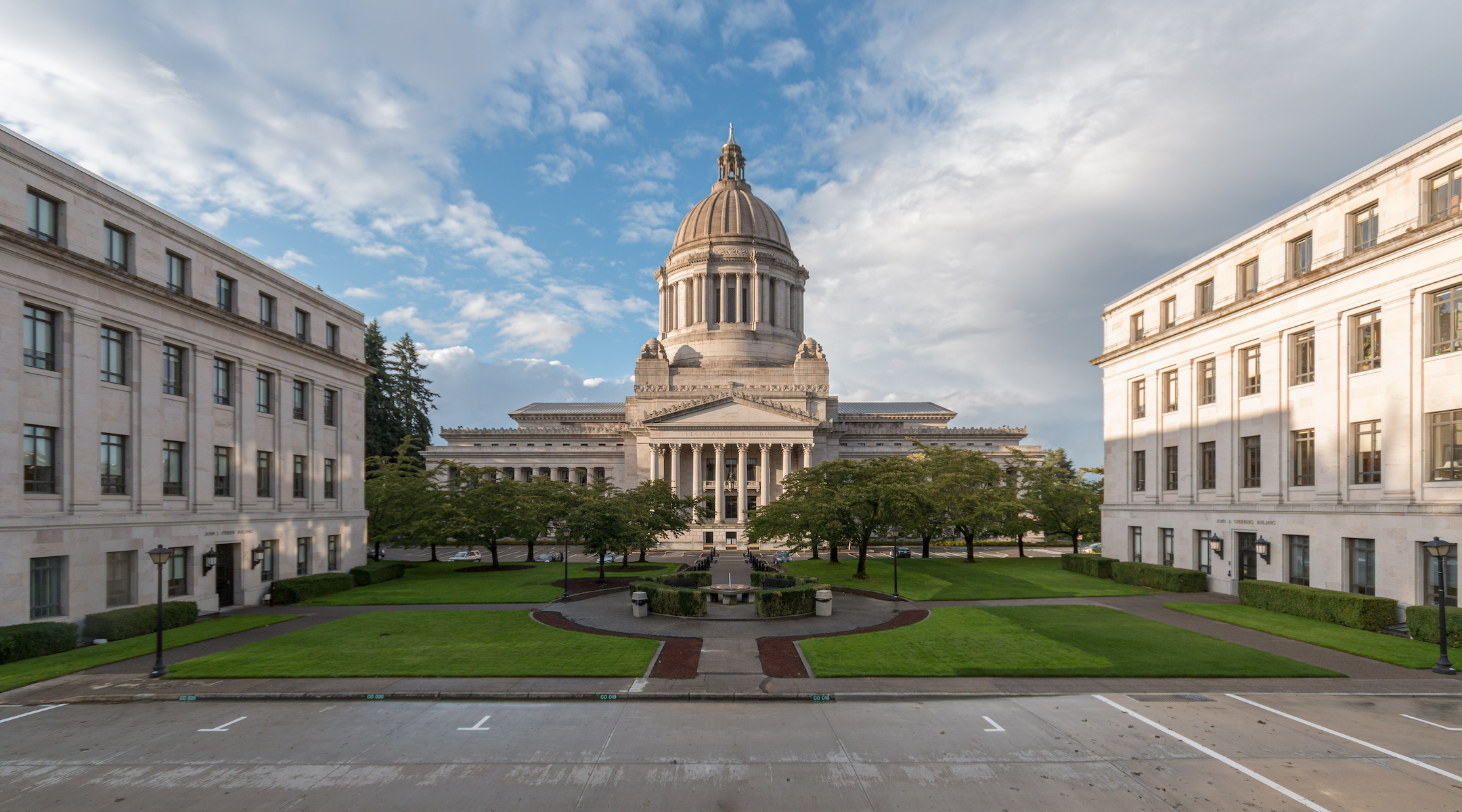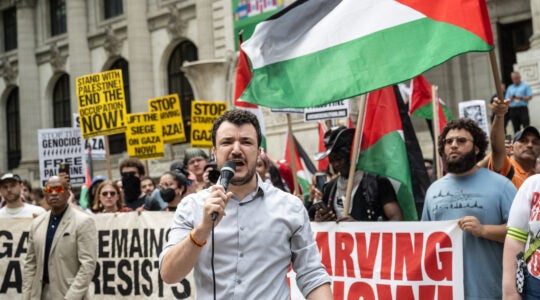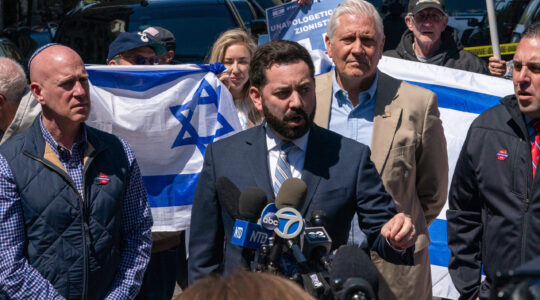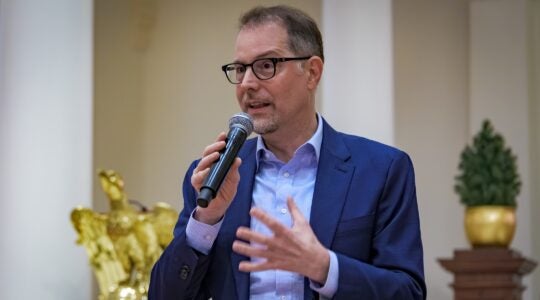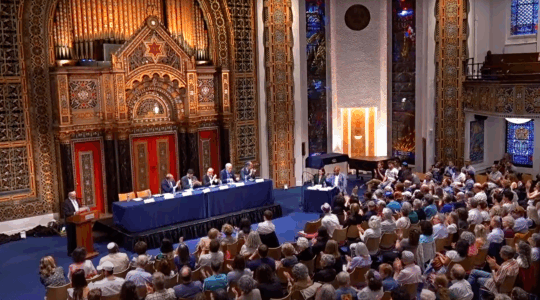(JTA) – A bill to mandate Holocaust education in Washington state’s middle and high schools died last week after debate over whether an amendment alluded to Israel’s war with Hamas.
H.B. 2037, introduced by a Republican state representative, would have built on a 2019 state law that suggested but did not mandate teaching the Holocaust in public schools.
The bill passed the House unanimously in Olympia but failed to advance out of a Senate education committee after Democrats added language that would require teaching about the experiences of “diasporic communities with lived experiences of surviving, being made refugee by, or otherwise being directly impacted by genocide.”
Republicans felt that the latest version of the bill contained implied references to Gaza Palestinians’ experience during the war.
The debate that led to the bill’s failure encapsulated several ways in which rancor over the Israel-Hamas war is affecting seemingly unrelated aspects of civic life.
The bill did not mention Israel or Gaza, but Republican state Sen. John Braun still told local media, “I think there’s all this effort to overlap the Holocaust with what’s happening in Gaza right now.”
The bill was controversial from the start within the state’s Jewish community. Its author, Republican state Rep. Travis Couture, did not consult the Seattle Jewish Community Relations Council, nor the Holocaust Center for Humanity in Seattle, prior to introducing it. This caught the museum’s CEO, Dee Simon, off guard: “Once he initiated the legislation, we couldn’t say, ‘No, we’re not going to back you,’” she told a local publication.
“There was not robust engagement with the Jewish community before the bill was introduced,” Tovah Bigeleisen, a spokesperson for the Jewish Federation of Greater Seattle, told the Jewish Telegraphic Agency. “Especially in a short legislative session, there has to be a lot of time to do stakeholder and community engagement before the session to help ensure the bill can move through the process. There was no time to do this, which is one of the reasons the legislative process unfolded as it did.”
The museum already regularly works with public schools in the state on Holocaust education and has recently undertaken a broader project to incorporate other genocides into its mission, including the Rwandan and Cambodian genocides, as well as the ongoing Uyghur genocide.
The issue reportedly became more fraught after two Democrats, Sen. Lisa Wellman and Rep. Emily Alvarado, introduced the amendment to broaden the scope of the required lessons, which they said they did to make their Democratic colleagues more comfortable in supporting the bill.
Couture took issue with the newly inserted phrase “being made refugee by” because, he told local outlets, “Jewish people were already removed from their homeland when they were in Europe and then systematically destroyed during the Holocaust.” Asked by another reporter what homeland he was referring to, he responded, “Israel.”
“They were not ‘made refugees by’ anything,” Couture continued. (Jews who fled Europe for the United States and other countries during the war and were rendered homeless after the Holocaust were legally considered refugees by the international community. The United Nations’ 1951 Refugee Convention was passed in the wake of the Holocaust.)
Through a spokesperson, Couture told JTA that he had other objections to amendments that he felt limited the bill’s power, including one that suggested using the United Nations definition of “genocide,” which he said “no one in the Holocaust education community agreed with.” (In fact, the website of the U.S. Holocaust Memorial Museum contains the same definition of genocide as the U.N.’s website.)
Couture also suspected his opponents were trying to broaden the bill’s scope to incorporate the Israel-Hamas war without explicitly referencing it, leading him to pull his support.
Couture declined to clarify his “refugees” comments, and declined comment on why he did not consult the Jewish community on his legislation.
A Republican colleague, noting the potential for “politicization,” said he was also concerned that the bill’s new language “could inadvertently lead to folks being accused of genocide who have not actually committed genocide.” The label of “genocide” has become a hot-button topic in Israel’s ongoing war with Hamas. Some progressives and pro-Palestinian groups have accused Israel of carrying out genocide in Gaza, and a genocide charge was brought against Israel by South Africa in the International Court of Justice. Israel and its allies vigorously reject the charge.
The bill also drew criticism from the left. Washington Ethnic Studies Now, a nonprofit advocacy group seeking to reform the state’s mandated ethnic studies classes around “anti-racist educators,” rejected both versions of the bill.
On Instagram, the group said one proposed version of the bill “empowers one white-led organization responsible for writing our multi-ethnic genocide curriculum,” referring to the Holocaust center. It also outlined its broader concerns with the bill, saying it “emphasizes a biased framing of genocide, prioritizing one genocide over the others, and excludes communities who have experienced genocide that are not officially recognized due to the inconsistent and political nature of international courts.”
The Holocaust museum and federation did ultimately back the bill and expressed disappointment that it didn’t pass, saying in a joint statement, “Although we did not initiate the legislation, we worked hard to support and move forward a strong, impactful bipartisan bill.”
The groups added, “However, extreme political views obfuscated the legislation to fit their own agendas,” and added that the bill’s failure “gives permission for the machinery of antisemitism to thrive.”
JTA has documented Jewish history in real-time for over a century. Keep our journalism strong by joining us in supporting independent, award-winning reporting.
